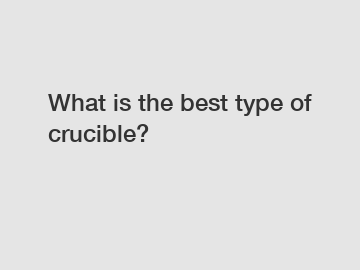Feb. 21, 2024
Minerals
Crucibles are essential tools in many industries, including metal casting, chemistry, and material science. They are used to melt, mix, and heat materials at high temperatures. Choosing the right crucible is crucial for achieving optimal results in any process involving high-temperature reactions. There are several types of crucibles available on the market, each with its own advantages and disadvantages. In this blog post, we will explore the different types of crucibles and determine which is the best type for various applications.
One of the most common types of crucibles is made from clay graphite. These crucibles are versatile and can withstand high temperatures, making them ideal for melting and casting metals such as aluminum, copper, and silver. Clay graphite crucibles are also relatively inexpensive, making them a popular choice for many applications. However, they have a limited lifespan and may need to be replaced frequently, especially when exposed to high temperatures for prolonged periods.
Another popular type of crucible is made from silicon carbide. These crucibles are durable and can withstand extremely high temperatures, making them suitable for melting and casting metals at temperatures exceeding 2,500 degrees Fahrenheit. Silicon carbide crucibles are also chemically inert, making them suitable for use with reactive metals and alloys. However, they are more expensive than clay graphite crucibles and may not be suitable for every application.

For applications requiring resistance to thermal shock, alumina crucibles are an excellent choice. Alumina crucibles are made from high-purity aluminum oxide and can withstand rapid temperature changes without cracking or breaking. They are ideal for use in processes where materials are heated and cooled repeatedly, such as in the production of ceramics or glass. Alumina crucibles are more expensive than clay graphite crucibles but offer superior durability and longevity.
In some cases, crucibles made from fused silica may be preferred. Fused silica crucibles are highly transparent, allowing for easy observation of the material being processed. They are also chemically inert and can withstand high temperatures, making them suitable for a wide range of applications. However, fused silica crucibles are fragile and prone to cracking if mishandled, making them unsuitable for some processes.
When choosing a crucible for a specific application, it is essential to consider the material being processed, the desired temperature range, and any special requirements, such as resistance to thermal shock or chemical compatibility. It is also crucial to consider the cost and lifespan of the crucible, as well as any maintenance requirements.
In conclusion, the best type of crucible depends on the specific application and requirements of the process. Clay graphite crucibles are a cost-effective and versatile option for many applications, while silicon carbide crucibles offer high-temperature resistance and durability. Alumina crucibles are ideal for processes requiring resistance to thermal shock, while fused silica crucibles provide excellent visibility and chemical inertness.
Ultimately, the best crucible for any application is the one that meets the unique needs and specifications of the process. By carefully considering the material being processed, temperature requirements, and other factors, it is possible to choose the ideal crucible for optimal results. Whether melting metals, processing ceramics, or conducting high-temperature experiments, selecting the right crucible is essential for success.
Contact us to discuss your requirements of high-purity graphite block, block of graphite, Carbon graphite blocks. Our experienced sales team can help you identify the options that best suit your needs.
Previous: Everything You Need to Know About Galvanized Steel Coils
Next: How to Choose the Best Fiberglass Filter Repair Service?
If you are interested in sending in a Guest Blogger Submission,welcome to write for us!
All Comments ( 0 )